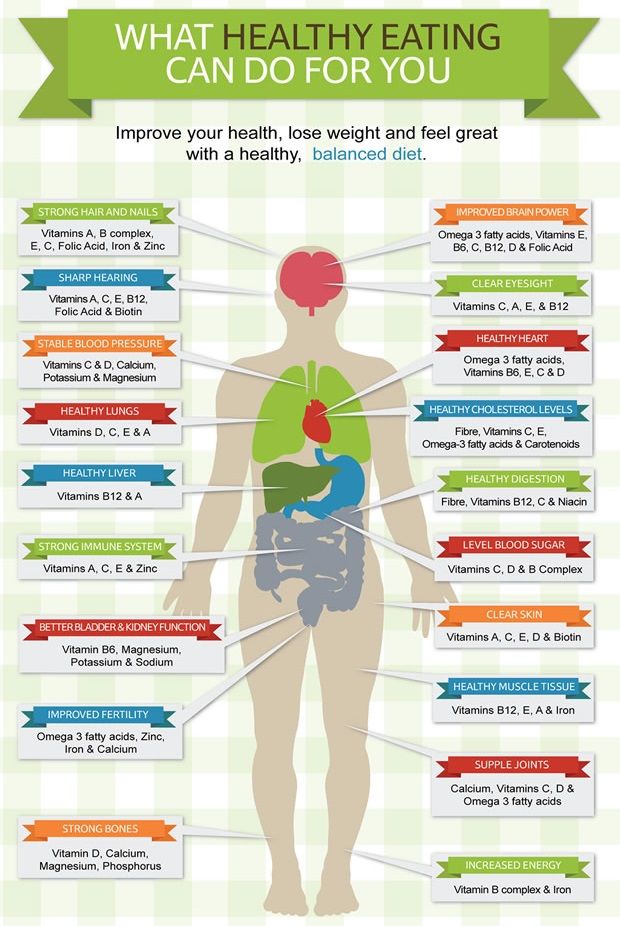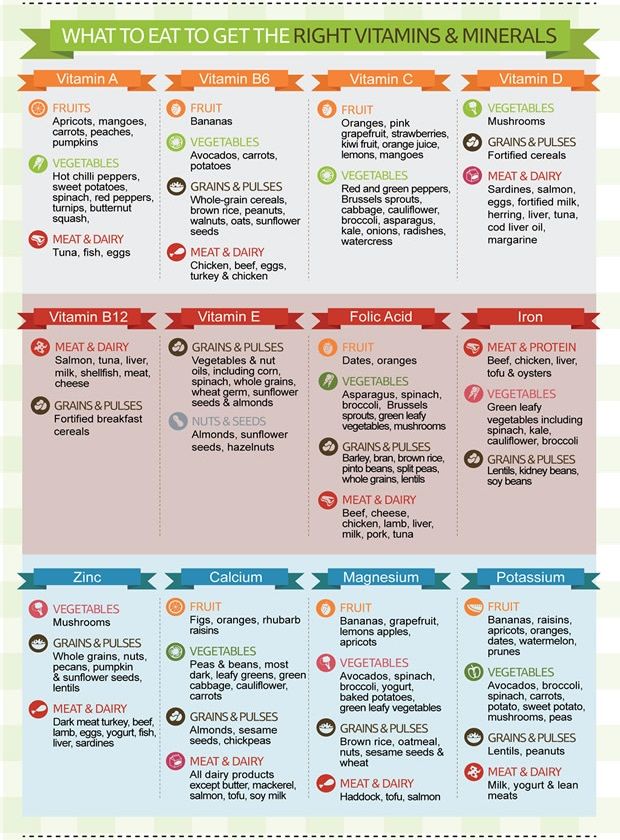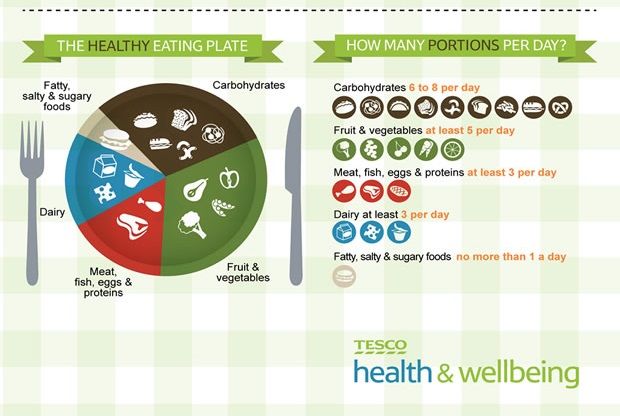Healthy eating and the benefits of vitamins in the body chart helps share how to find natural sources in everyday foods to strengthen a person’s overall general health. Sometimes we have certain health concerns and have a desire to try to eat healthier in an effort to correct them.
“The food you eat can be either the safest and most powerful form of medicine or the slowest form of poison.” ― Ann Wigmore
Click here to view in a larger form:
Look below ad banner to see the rest of the article.

Here’s a list of which vitamins, minerals and foods you need to improve various functions in the body.
Stronger Hair and Nails – Vitamins A, B Complex, E, C, Folic Acid, Iron & Zinc
Sharp Hearing – Vitamins A, C, E, B12, Folic Acid & Biotin
Stable Blood Pressure – Vitamins C & D, Calcium, Potassium & Magnesium
Healthy Lungs – Vitamins D, C, E & A
Healthy Liver – Vitamins B12 & A
Strong Immune System – Vitamins A, C, E & Zinc
Better Bladder & Kidney Function – Vitamin B6, Magnesium, Potassium & Sodium
Improved Fertility – Omega 3 fatty acids, Zinc, Iron & Calcium
Strong Bones – Vitamin D, Calcium, Magnesium, Phosphorus
Improved Brain Power – Omega 3 fatty acids, Vitamins E, B6, C, B12, D & Folic Acid
Clear Eyesight – Vitamins C, A, E, & B12
Healthy Heart – Omega 3 fatty acids, Vitamins B6, E, C & D
Healthy Cholesterol Levels – Fibre, Vitamins C, E, Omega 3 fatty acids & Carotenoids
Healthy Digestion – Fibre, Vitamins B12, C & Niacin
Level Blood Sugar – Vitamins C, D & B Complex
Clear Skin – Vitamins A, C, E, D & Biotin
Healthy Muscle Tissue – Vitamins B12, E, A & Iron
Supple Joints – Calcium, Vitamins C, D & Omega 3 fatty acids
Increased Energy – Vitamin B Complex & Iron

Here is different ways to find Vitamins within your food sources:
Vitamin A
-
Fruits – Apricots, mangoes, carrots, peaches, pumpkins
-
Vegetables – Hot chili peppers, sweet potatoes, spinach, red peppers, turnips, butternut squash
-
Meat and Dairy – Tuna, fish, eggs
Vitamin B6
-
Fruit – Bananas
-
Vegetables – Avocados, carrots, potatoes
-
Grains and Pulses – Whole-grain cereals, brown rice, peanuts, walnuts, oats, sunflower seeds
-
Meat and Dairy – Chicken, beef, eggs, turkey
Vitamin C
-
Fruit – Oranges, pink grapefruit, strawberries, kiwi fruit, orange juice, lemons, mangoes
-
Vegetables – Red and green peppers, brussel sprouts, cabbage, cauliflower, broccoli, asparagus, kale, onions, radishes, watercress
Vitamin D
-
Vegetables – Mushrooms
-
Grains and Pulses – Fortified cereals
-
Meat and Dairy – Sardines, salmon, eggs, fortified milk, herring, liver, tuna, cod liver oil, margarine
-
Vitamin B12
-
Meat and Dairy – Salmon, tuna, liver, milk, shellfish, meat, cheese
-
Grains and Pulses – Fortified breakfast cereals
Vitamin E
Grains & Pulses – Vegetables & nut oils, including corn, spinach, whole grains, wheat germ, sunflower seeds & almonds
Nuts and Seeds – Almonds, sunflower seeds, hazelnuts
-
Folic Acid
-
Fruit – Dates, oranges
-
Vegetables – Asparagus, spinach, broccoli, brussel sprouts, green leafy vegetables, mushrooms
-
Grains and Pulses – Barley, bran, brown rice, pinto beans, split peas, whole grains, lentles
-
Meat and Dairy – Beef, cheese, chicken, lamb, liver, milk, pork, tuna
Iron
-
Meat and Protein – Beef, chicken, liver, tofu & oysters
-
Vegetables – Green leafy vegetables including spinach, kale, cauliflower, broccoli
-
Grains and Pulses – Lentils, kidney beans, soy beans
Zinc
-
Vegetables – Mushrooms
-
Grains and Pulses – Whole grains, nuts, pecans, pumpkin & sunflower seeds, lentils
-
Meat and Dairy – Dark meat turkey, beef, lamb, eggs, yogurt, fish, liver, sardines
Calcium
-
Fruit – Figs, oranges, rhubarb, raisins
-
Vegetables – Peas & beans, most dark, leafy greens, green cabbage, cauliflower, carrots
-
Grains and Pulses – Almonds, sesame seeds, chickpeas
-
Meat and Dairy – All dairy products except butter, mackerel, salmon, tofu, soy milk
Magnesium
-
Fruit – Bananas, grapefruit, lemons, apples, apricots
-
Vegetables – Avocados, spinach, broccoli, yogurt, baked potatoes, green leafy vegetables
-
Grains and Pulses – Brown rice, oatmeal, nuts, sesame seeds & wheat
-
Meat and Dairy – Haddock, tofu, salmon
Potassium
-
Fruit – Bananas, raisins, apricots, oranges, dates, watermelon, prunes
-
Vegetables – Avocados, broccoli, spinach, carrots, potato, sweet potato, mushrooms, peas
-
Grains and Pulses – lentils, peanuts
-
Meat and Dairy – Milk, yogurt & lean meats

How Many Portions Per Day?
Carbohydrates – 6 to 8 per day
Fruits and Vegetables – at least 5 per day
Meat, Fish, Eggs and Proteins – at least 3 per day
Dairy – at least 3 per day
Fatty, Salty and Sugary foods – no more than 1 per day


